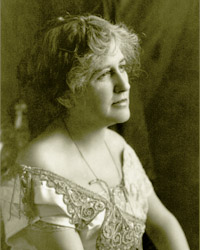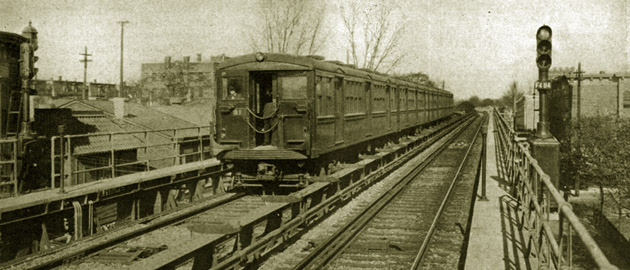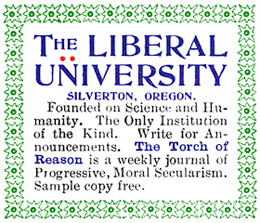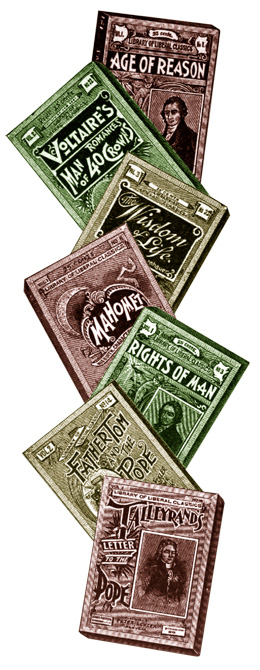By Helen H. Gardener — September, 1900
 I had grown accustomed to see him day after day, as the elevated express train flew past his window, sitting there at some kind of work. My curiosity had led me to peer into his room, as far as I could, in the swift glance I was able to get each time as the train sped around the curve before the call came, “Fiftieth street! Next stop Forty-second!” But try as I might I was never able to learn the nature of his occupation, whether he was reading, writing, painting or drawing. He seemed always absorbed. Sometimes, it is true, he glanced out, but the passing train was as if it were not to him. His eves seemed to have simply lifted to rest themselves, and the look in them was not one of recognition of the noisy passerby, but only that of a student at his work, whose brain holds to its thread of thought, although the eye takes another focus. He was comfortably clothed and in good taste always, and appeared out of keeping with the locality and class of room his must be. I built various theories about him, but none of them seemed to fit, and each day as my train neared the curve I would look up from my paper to catch another glimpse of The Man at the Window, as I had grown to call him in my own mind, to see if, by any chance, I could get a sight of his hands to learn, if possible, their exact occupation. I always failed. Finally I was surprised, one fine May morning, to see him sitting as usual, but in his shirt sleeves. I smiled with the thought that with the coming warm days he would open his window, and I would then have a better chance to see what he was doing. I said to my neighbor in the seat: “Did you ever see that man who sits day after day at that window? Watch now, look! There he is, see?”
I had grown accustomed to see him day after day, as the elevated express train flew past his window, sitting there at some kind of work. My curiosity had led me to peer into his room, as far as I could, in the swift glance I was able to get each time as the train sped around the curve before the call came, “Fiftieth street! Next stop Forty-second!” But try as I might I was never able to learn the nature of his occupation, whether he was reading, writing, painting or drawing. He seemed always absorbed. Sometimes, it is true, he glanced out, but the passing train was as if it were not to him. His eves seemed to have simply lifted to rest themselves, and the look in them was not one of recognition of the noisy passerby, but only that of a student at his work, whose brain holds to its thread of thought, although the eye takes another focus. He was comfortably clothed and in good taste always, and appeared out of keeping with the locality and class of room his must be. I built various theories about him, but none of them seemed to fit, and each day as my train neared the curve I would look up from my paper to catch another glimpse of The Man at the Window, as I had grown to call him in my own mind, to see if, by any chance, I could get a sight of his hands to learn, if possible, their exact occupation. I always failed. Finally I was surprised, one fine May morning, to see him sitting as usual, but in his shirt sleeves. I smiled with the thought that with the coming warm days he would open his window, and I would then have a better chance to see what he was doing. I said to my neighbor in the seat: “Did you ever see that man who sits day after day at that window? Watch now, look! There he is, see?”
“Noticed him often,” he said. “Queer duck!” and he went on reading his paper.
After that I fell to asking others, and found that he had attracted the attention of many of those who regularly traveled the route, and all agreed that they had, unaccountably to themselves, taken an interest in him, and they had not, before, seen him sitting with his coat off, while this style of undress was general with the occupants of the other neighboring rooms.

The two following days were warm and my man at the window continued to sit without his coat. The third day turned out raw and cold, and I confess it was a shock to me, when, as we whizzed past, I saw him still sitting in his shirt sleeves.
“Pawned it, I reckon,” said one.
“Everybody who lives along there is likely to get things in soak pretty often,” added another.
“Got so stuck on his job, the last few days, he forgot to dress himself,” laughed a third, and so the different bits of more or less indifferent speculation went on until the curve was rounded and The Man at the Window forgotten for the morning paper or the stock market. On the sixth day, as the train was passing the window where the strange man still sat, without his coat, the brakeman, observing my interest, said eagerly, “I wish somebody’d find out what’s up with him,” pointing to The Man at the Window “He used to look more’n one way. Lately he don’t.”
“What do you mean?” I asked. “Well, he looks kind of froze, lately—or, set. You come out on the platform this evenin’, and watch if he don’t. I’ve got so just to seein’ him I’d miss him if he weren’t there, like I would a regular station platform if it was to leave: but the last few days his gate seems kinder shut and as if the brakes didn’t work natural.” That evening the winds were pretty sharp, but I stepped out on the platform just before we came to the curve and fixed my eyes for a quick, good look. I got it. The brakeman and I stared at each other, and it was plain that we agreed in our suspicion that something was wrong. I got off at the next station and went down the stairs. A policeman stood near the corner and I told him what I believed and went back with him to point out the window. He concluded to investigate and asked me to go with him.
It was a meanly-furnished house, but its occupants were respectable. Most of them men and women, “ate out” or did “light housekeeping” in their rooms. We knocked at the door of the third floor front but received no reply. Then the officer tried the door. It opened easily and we entered. Sitting bolt upright, at the window, with a small table near him and upon which paper, ink, pencils and notebooks was our man, stone dead. He had evidently been dead some days, in sight and hearing of hundreds, with his door unlocked in a house full of people, and no one had suspected that anything was wrong!
We set about discovering his identity by examining his pockets. He was evidently far above his surroundings and a man of culture. His few belongings were of a quality not common in such a house, and his dignified appearance told of a lift; different from that of his neighbors, none of whom knew him. We learned from his notebook that he had come to New York from a Western town some months before and that he had been waiting here for someone who was to return from Europe—some one who had gone on a very special and important errand. There had been many delays. Evidently his money had been exhausted and he had been living here, economizing, waiting and hoping, meanwhile working on the manuscript which lay on the table.
The policeman went out to telephone to the coroner, leaving me, meanwhile, alone with the dead man. I felt strangely interested in him and not the least repulsion. He sat as calm, dignified and serene, as if about to speak. I felt a kind of satisfaction in the thought that he had not been deliberately sitting at that window for the past few days only partly clothed. Such an act had appeared out of keeping with the man, and now it was quite clear that death had overtaken him when in the act of dressing. Everything about the room showed this—the towel he had just used, his freshly brushed hair and neatly adjusted tie, all indicated it. I felt in his vest pocket to learn if he had a watch, and drew out a handsome timepiece, in the front case of which was the photograph of a beautiful woman. Under the picture was written in a very delicate hand, the one word, “Forever.” I opened the back case and a bit of fine paper was pasted there, on which were written these words, “In case of accident to me wire, at once, to Glen Bailey,—Street, Denver, Colorado. My name is Edward Martin.” The Denver address had been marked out and above it was written a foreign name which I could not read. I was still struggling with this name when the officer returned and I showed him my “find.”
“We’ll wire to Denver,” he said, “and mark it ‘please forward.’ That will catch Glen Bailey, I guess. Partner, I judge. Have you gone through any of that?” pointing to the manuscript on the table. No? Well, the coroner will be here soon. We must not disturb things much, but maybe we could clear things up some if we give this a look. It’ll be a big story for the papers. I’ll stand in with a reporter I know on this; but you get a start there while I send that Denver message.” He took the watch and left me alone again with the dead man. I was going carefully through the manuscript, which seemed to be of a legal nature, when the door, which the officer had left ajar, opened and someone stepped in. “Back so soon?” I said, without turning my head. “This appears to be the manuscript of a law book or paper, if I can judge correctly. He was working on wills and deeds, evidently. and—”
I turned to see the frightened face of a handsome young woman, in traveling cloak and hat.
“Beg pardon,” she said, “I was directed here to find Mr. Edward Martin. Has he-is he-doesn’t he live here?”
I stepped hastily between her and the dead man, sitting with his face to the window, bolt upright in his chair. The young lady made a hasty step backward. “He gave this as his address when he last wrote me at Hamburg, and down stairs they tell me—” Hamburg! That was the word written in the watch over the erased Denver. “Are you Glen Bailey?” I asked, looking straight into her eyes. She smiled up at me frankly. “Yes. How did you know? Did he tell you? I thought he’d meet me at the steamer, but-what is the matter?” She suddenly pushed by me and stood beside the silent man at the window.
“Edward! What have they done to you? Speak to me. Edward, my darling! Oh, my God, he is dead!” She threw her arms about him and kissed his cold face and hands and wept aloud. She had forgotten my very existence and I stood helplessly by, not knowing what was best to do in the presence of her awful grief. Then the officer returned, bringing with him the coroner, who was a physician. At their heels was a reporter. “That is Glen Bailey,” I said to the officer as he passed me. “That other word in the watch is Hamburg:” “They made it out at the telegraph office,” he said, “and we cabled there instead of to Denver; but—”
Suddenly the young woman seemed to realize that four other men than the one she loved were present, and she cried out to us to help her, to get a doctor, to do something for him. “He has overworked, he has waited here so long alone, waiting for me, and I could not get back sooner and do all that he sent me to do. I am his wife. I have saved his fortune over there. All his papers were right, but— Why in God’s name don’t you do something for him now? He is not, he can’t be dead. Oh, my God, he can’t be dead!”
Afterward we got from her by degrees, slowly and painfully, something of the facts. I think the reporter and the coroner, whom we made her understand was a doctor, drew her story out, step by step. She was Glen Bailey Martin. They had been married only a short time when his fortune, which was chiefly invested in Germany, had been claimed by another branch of the Martins, and he had sent his young wife with the papers to prove his identity, while he remained to fight the case as only he could, on this side, and to cable her all new evidence as he collected it. All of his ready money had gone in his struggle, but they had succeeded, and she had cabled to him to meet her at the steamer’s landing. Then they were to go back to Denver happy and content.
Had the good news been too great a joy after the long strain? Had the heart that bore up bravely under adversity failed at the touch of relief? Nobody knew. The doctors united in calling it a case of heart failure, and the poor little widow went sorrowfully home to Denver with her dead. The reporter had a “scoop” on his rivals, headed “Found Dead in His Chair.” The brakeman on the elevated express and the hundreds of daily travelers gazed curiously at the dingy vacant window, with “To Let” in large black letters hung in it awry, and the tenants in the adjoining rooms neither knew nor cared about the tragedy under their roof. So isolated was each human pawn from its nearest neighbor. So absorbed was the great metropolitan heart with the throb of its personal pulse beat. And The Man at the Window was forgotten by all the thousands that saw him sitting there stone dead for a whole week as they “passed by on the other side,” unheeding, unknowing, unconcerned.





